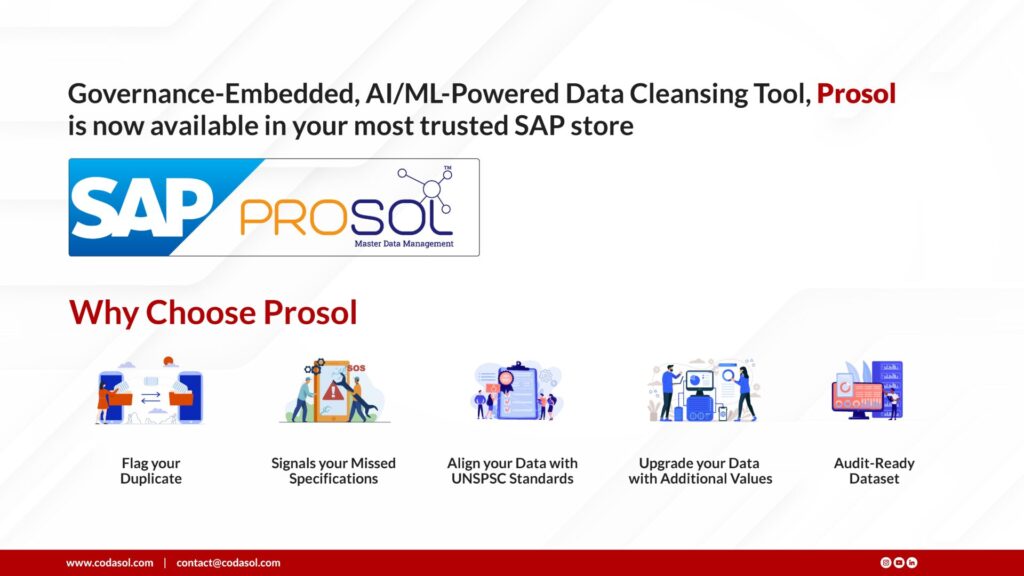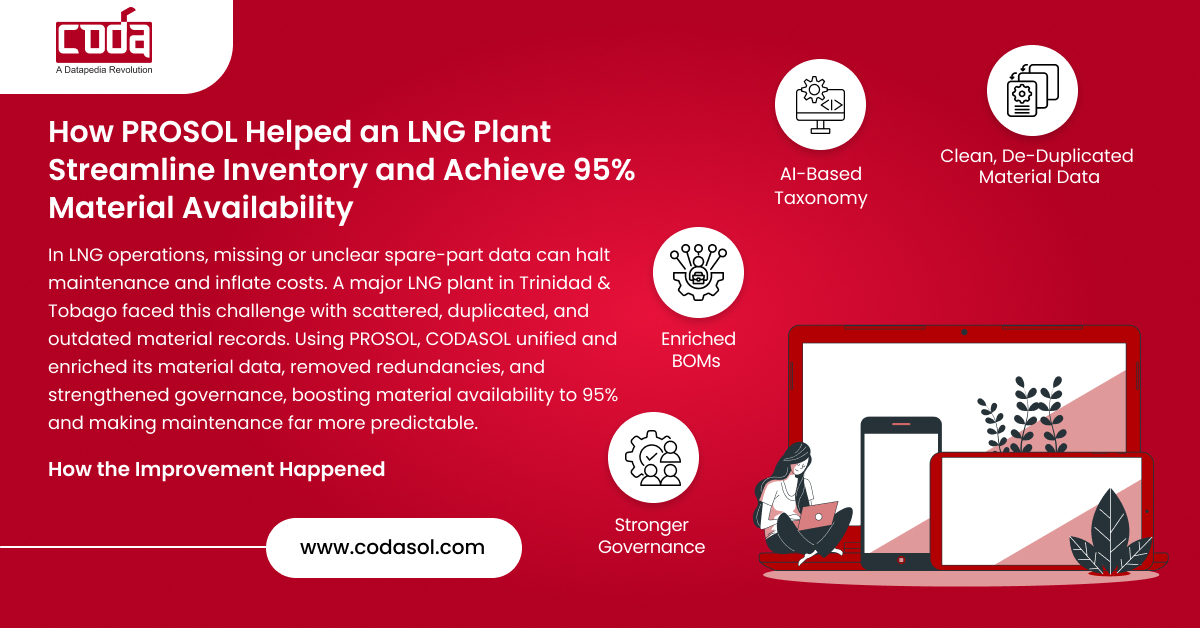How PROSOL Helped an LNG Plant Streamline Inventory and Achieve 95% Material Availability
In asset-intensive industries like LNG production, even a few hours of downtime can translate into millions in losses. One of the biggest hidden causes? Poor data and a lack of material availability improvement across maintenance and procurement systems. When maintenance teams can’t find the right spares, and procurement teams are working with duplicates or incomplete material specifications, the entire value chain suffers.
A leading LNG producer in Trinidad and Tobago faced this exact challenge: fragmented master data, inconsistent material records, and delayed maintenance operations. Within three months, PROSOL, CODASOL’s AI/ML-powered Master Data Governance platform, helped the plant achieve 95% material availability and transform its data into a strategic operational asset.
Why Material Availability Defines Reliability
In industries like Oil & Gas, Utilities, and Manufacturing, material availability is a key reliability indicator. It measures how often the right spare part is available when needed for maintenance or production.
Low material availability means:
- Delayed maintenance jobs and extended equipment downtime.
- Higher procurement costs from emergency buying.
- Overstocking of non-critical items and obsolescence losses.
According to industry research, poor material availability can consume up to 20% of total maintenance hours, slowing production and driving unnecessary costs.
At the LNG plant, the issue was systemic:
- Over 100,000 tagged assets across four trains (Train 1–4).
- 400,000+ pages of legacy documentation stored in multiple formats.
- Material master data with only 30–35% usable specifications.
- Duplicate and obsolete materials inflating stock and spend.
The Challenge:
Data Silos and Redundant Records
The plant’s maintenance and procurement teams worked across multiple systems like Oracle Fusion, IBM Maximo, and standalone spreadsheets. None of them communicated effectively.
Without a standardized material catalogue, the same spare appeared under several codes, with inconsistent descriptions, units, and vendor data.
Work orders were delayed because technicians couldn’t locate the right materials, while procurement teams often reordered spares that already existed in the system. This fragmented visibility was costing time, money, and production continuity.
The plant needed one unified platform to cleanse, standardize, and govern its material master data, at scale.
PROSOL: Master Data Governance for Industrial Operations
CODASOL’s PROSOL was built for enterprises where physical assets and data precision drive profitability. It combines AI/ML-powered data cleansing, taxonomy standardization, and governance workflows to deliver accurate, traceable, and actionable material data.
PROSOL is also available on the SAP Store, giving SAP users a trusted, integration-ready solution for master data governance that aligns with ISO and industry standards.

Key Capabilities
- AI-driven fuzzy search to detect and prevent duplicates.
- Automated short and long description generation for catalogued items.
- Standardization based on ISO 8000, ISO 14224, ECLASS, and UNSPSC.
- Real-time integration with SAP, Oracle, and Maximo.
- Role-based governance ensuring accuracy and accountability.
- Data enrichment and taxonomy mapping for every material and asset type.
Built on CODASOL’s 3C Framework — Create, Correct, Cultivate.
PROSOL ensures data remains accurate, governed, and continuously improving.
The Transformation:
The project was executed in four phases, combining field audits, AI automation, and enterprise integration.
Cleansing and Standardization (Phase 1)
- Analyzed and catalogued over 35,000 stock and 31,000 non-stock items.
- Removed duplicates and corrected incomplete or inconsistent descriptions.
- Unified naming conventions, units of measure, and specification fields.
- Improved data accuracy from ~35% to 95%, ensuring traceable, reliable information for every spare.
AI/ML Enrichment and BOM Creation (Phase 2)
- Parsed 400,000+ unstructured pages of legacy documentation.
- Used AI and natural language processing (NLP) to extract key technical attributes.
- Automatically generated 1,600 new Bills of Material (BOM) items, linking assets and spares for accurate maintenance planning.
- Identified and flagged obsolete and redundant materials for elimination.
ERP Integration and Governance (Phase 3)
- Uploaded cleansed and standardized data into Oracle Fusion and Maximo.
- Deployed PROSOL’s governance workflows to validate new master records.
- Introduced proactive duplicate avoidance through fuzzy matching and scoring.
- Enabled real-time dashboards for data lineage, audit trail, and approval processes.
Inventory Optimization and Decision-Making (Phase 4)
- Rationalized redundant stock and improved reorder parameters.
- Introduced category management and frame agreements for key spares.
- Supported predictive maintenance with accurate, BOM-linked inventory data.
- Established a foundation for future ERP migration and analytics initiatives.
The Results: 95% Material Availability in Three Months
| Metric | Before | After (with PROSOL) | Impact |
|---|---|---|---|
| Material Availability | ~70% | 95% | Reduced downtime, faster work orders |
| Data Accuracy | ~35% | 90–95% | Reliable maintenance planning |
| Redundant Stock | High | Reduced by 18% | ~$1.68M cost avoidance |
| Maintenance Efficiency | Low | +$400K/year | Shorter Mean Time to Repair (MTTR) |
| Document Usability | Unstructured | 400K+ pages indexed | Instant access to asset data |
Within 90 days, the LNG plant’s material availability improved from reactive to predictive. The maintenance team gained instant access to verified data, while procurement could forecast needs with precision.
Operational results included:
- Streamlined work order planning and reduced delays.
- Fewer emergency purchases and optimized stock levels.
- Clear linkages between materials, assets, and BOMs.
- Measurable reduction in maintenance turnaround time.
Why Material Availability Improvement Matters for Industry Leaders
Every asset-intensive enterprise, from refineries to utilities, faces the same fundamental challenge: operational readiness depends on data accuracy.
Material availability improvement is not just about reducing downtime. It’s about:
- Empowering maintenance and procurement teams with reliable data.
- Building data-driven decision frameworks that enhance reliability.
- Ensuring every spare, material, and asset is traceable, verified, and standardized.
With PROSOL, data becomes the enabler of uptime, not an obstacle to it.
The 90-Day Framework for Material Availability Improvement
CODASOL’s proven roadmap can help any industrial enterprise replicate this success.
Data Audit & Cleansing (Month 1)
- Identify duplicates, incomplete records, and obsolete stock.
- Standardize taxonomy and descriptions across systems.
Integration & Governance (Month 2)
- Deploy PROSOL or equivalent governance system.
- Implement workflows and approval hierarchies for new master creation.
Optimization & Analytics (Month 3)
- Define reorder levels and safety stock.
- Monitor material availability KPIs and governance compliance.
This structured 90-day approach consistently helps organizations achieve over 90% data accuracy and 95%+ material availability.

Ready to Achieve 95% Material Availability?
See how PROSOL can help your plant eliminate data silos, harmonize material records, and drive predictive reliability.
Frequently Asked Questions
1. What does “material availability improvement” mean?
It’s the process of ensuring that every required spare or material is available when needed, powered by accurate, standardized, and traceable data.
2. How is PROSOL different from other MDM tools?
PROSOL is purpose-built for industrial environments, combining AI/ML enrichment, ERP integration, and role-based governance tailored for asset-intensive operations.
3. How fast can results be seen?
Most clients achieve significant improvements within 3–4 months, with measurable increases in material accuracy and availability.
4. Can PROSOL integrate with our ERP system?
Yes. PROSOL integrates seamlessly with SAP (via its SAP Store listing), Oracle, and Maximo environments through APIs or middleware.
5. What ROI can organizations expect?
Typically, 15–25% reduction in redundant stock, 10–20% cost savings in procurement, and improved maintenance reliability metrics within the first year.
Conclusion:
Data Accuracy Drives Industrial Reliability
For industrial decision-makers, data quality has become an operational metric. The Atlantic LNG case shows that material availability improvement is achievable when you treat data as a strategic asset. With PROSOL, trusted by global enterprises and available on the SAP Store, accurate data becomes the foundation for reliable operations, cost savings, and business continuity.

